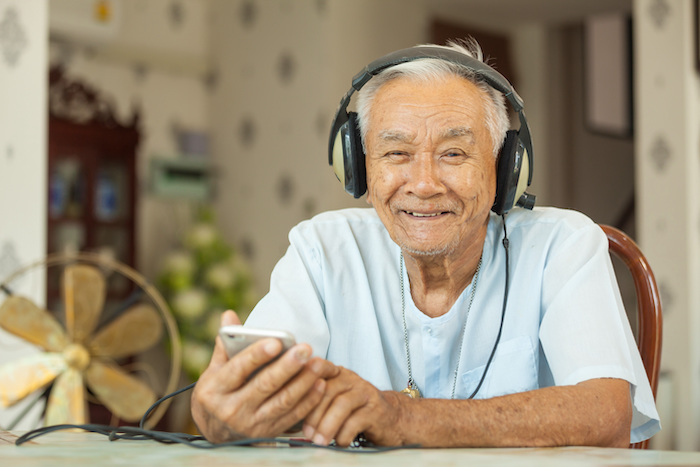This article by Caroline Szachnowski was originally published on McKnight’s Senior Living, July 19, 2021.
An older woman with dementia may not remember the day of the week or what she last ate, but when given a headset, the dementia fog fades. She is transported into another world: one she remembers well. Memories of dancing with friends, singing along in the car and humming classic rock fill her mind.
This is according to Dan Cohen, dementia and Alzheimer’s expert and star of the critically acclaimed “Alive Inside” documentary, who divulges the profound impact of music on seniors living at home.
“People would light up when I connected them with songs they loved,” Cohen told McKnight’s Home Care Daily.
Cohen has a background in social work, and first grasped the importance of music for the elderly as a local nursing home volunteer. He observed that while nursing homes already had a variety of music for their residents to listen to, it was not necessarily music the residents loved — something Cohen took upon himself to change.
He founded Music & Memory in 2010 with the goal of helping to educate and train long-term care communities, adult day programs, hospitals and home care providers about how to apply music use on a larger scale. A key aspect of Music & Memory is helping create custom playlists of music for seniors.
The benefits of bringing music into the home are numerous, he said.
“For people with dementia, listening to music that they love can reduce anxiety, stress, loneliness and depression,” Cohen said. “Providing music holds special meaning to people. It taps into their emotional memory, which is still very much intact, even to those with end-stage dementia.”
A function of long-term memory
Music is effective with people with dementia because it taps into long-term memory.
“Dementia affects short-term memory and does not disrupt or take away our ability to recall music that we love, especially from our youth,” Cohen said. “Music lights up more parts of the brain than any of our other senses, and hearing is the last sense to go. Even if someone’s in their last moments of life and they’re not responsive, they might very well be able to hear the music.”
Listening to music also offers many elderly a sense of safety and comfort amidst dementia fog. With dementia and Alzheimer’s taking away so much familiarity from their lives, music can help ground them and help them maintain their dignity and sense of self, he said.
“Dementia or cognitive decline is a very distressing situation for people,” Cohen explained. “They’re very frustrated, and the music is familiar. It helps them maintain their sense of self within their own confusion.”
Not only does music benefit the patient, it benefits the caregiver as well. Because it facilitates patient cooperation, it can improve worker morale.
“Research also confirms that people who are enjoying their music are much less likely to be aggressive, less likely to fall and less likely to need antipsychotic medications,” Cohen explained. “Different research around this shows that caregivers’ stress is actually cut in half … People are able to enjoy their day more and look forward to coming to work.”
Music during isolation
Bringing music into the home also fosters relationships and builds connection. The need for human connection was made especially clear among older adults at home during the COVID-19 pandemic. With music, caregivers could help engage with seniors.
“Most older adults have lost the ability to access their music,” Cohen said. “Devices have changed, so home care providers have an opportunity to bring success to their engagements by making it possible for people to access their music.”
To help develop playlists for seniors, Cohen recommends that home care providers be trained on the benefits of music use and how to approach connecting people with music. Fortunately, there are many options and a variety of playlists to work with. Sources of the playlists can be Spotify, an mp3 player, Apple Music or Pandora, depending on the person’s preferences and which of these systems work best in that person’s home care environment.
When it comes to determining what the patient will enjoy listening to, a sure way to measure that success is seeing the smiles on people’s faces when a particular song resonates with them.
Cohen also adds that a general rule of thumb is to go by upbeat versus calming music, depending on the time of day and purpose, as opposed to going by genres.
“I would often make playlists for an individual where one would help them get going in the morning,” Cohen said. “If the guy’s been a veteran, let’s play patriotic music, something upbeat, and at night, something that’s calming.”
Using music in the home of a dementia or Alzheimer’s patient has already improved the lives of many homebound patients. Cohen is determined to continue this movement.
“Music helps because it’s a wonderful way to improve the experience of both the person cared for and the home care provider.”
Image: WitthayaP


One Comment
Kevin Coughlin
Great article!